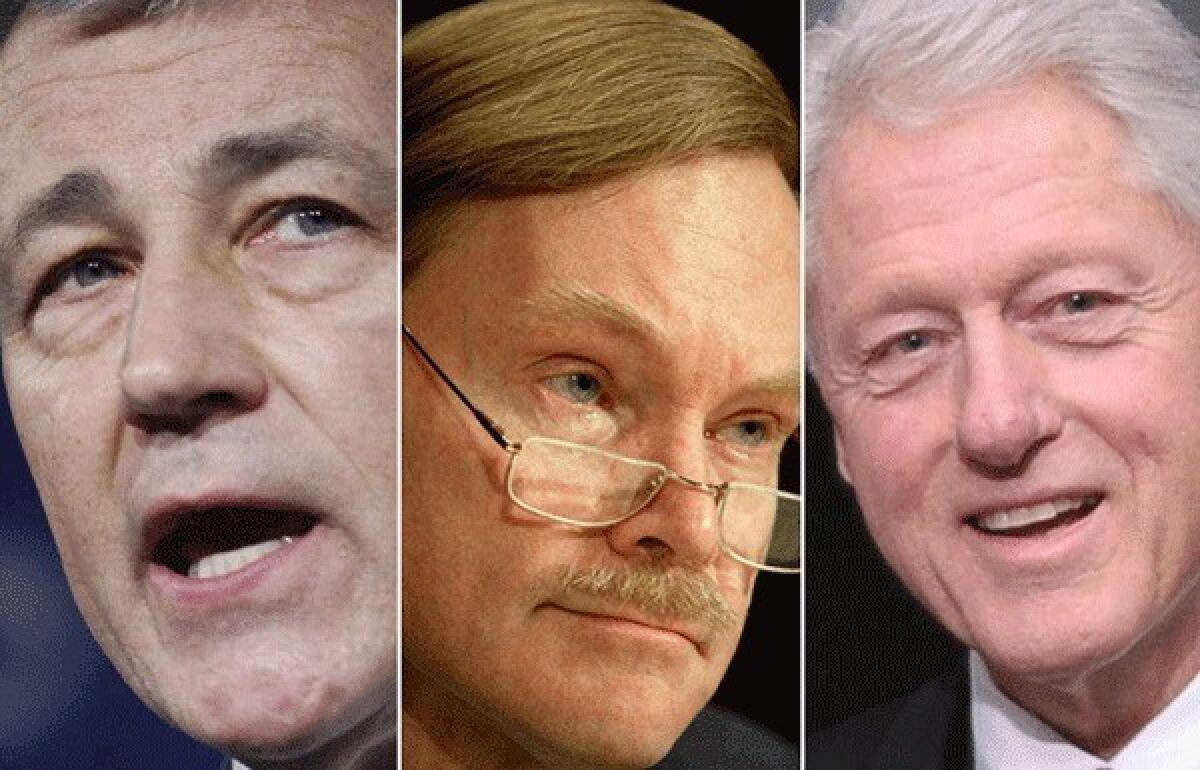3 unconventional picks for secretary of State

- Share via
With the 2012 presidential election over, attention nows turns to the inevitable shuffling of personnel in the Obama administration. Chief among the vacancies will be at the helm of the State Department, where Secretary of State Hillary Rodham Clinton has indicated her intent to retire.
After heavy media coverage speculating on the appointment of Massachusetts Sen. John Kerry, rumors have more recently coalesced around U.N. Ambassador Susan Rice for the position. Rice’s qualifications are difficult to contest. In addition to her four years at Turtle Bay, she has stints in the Clinton administration on the National Security Council and as an assistant secretary for African affairs. Moreover, she would be following the path of Madeleine Albright, who made a similar move from the U.N. post in President Clinton’s second term.
Yet the Rice choice — leaving aside a looming confirmation fight — would not be particularly inspired or inspiring. A more dynamic choice could set a better foreign-policy tone, reassuring allies and indicating firmness to potential global opponents. Here are three unconventional options:
The Republican — Robert Zoellick. An across-party-lines pick for secretary of State would be not only headline-grabbing but sui generis in the modern era. Zoellick’s experience and Obama’s own stated desire for national unity should lead to serious consideration for this type of nomination.
Zoellick has extensive State Department experience, having served in the administrations of both Bushes (as counselor and undersecretary in the George H.W. Bush years, and as deputy secretary in the George W. Bush years). His resume is also heavy on the economic issues that have become so interlinked with foreign policy concerns, whether in Asia, Europe or elsewhere. He headed the World Bank for five years, was George W. Bush’s first U.S. trade representative and pressed economic issues as part of his undersecretary portfolio.
Obama has experience with a prominent cross-party Cabinet official, having made the important decision to keep Robert Gates on as secretary of Defense following his first inauguration. Zoellick would be no less an inspired choice at State.
The cross-over Republican — Chuck Hagel. A former Republican senator who voted for the war in Iraq might seem an odd choice, but if that senator is Nebraskan Chuck Hagel, a highly decorated Vietnam veteran, the possibilities are more intriguing. In the latter part of his tenure in the Senate, Hagel increasingly distanced himself from the Bush administration’s foreign policy, and struck up a friendship with then-Sen. Obama. Since then, he has moved closer to the Democratic Party, endorsing various Democratic candidates for offices, and currently serves as co-chairman of the president’s Intelligence Advisory Board.
Hagel’s credentials are solid, having served on the Senate’s Foreign Relations Committee and as chairman of the Atlantic Council. And it has been rumored that Obama considered him for vice president and secretary of Defense. His consideration could mark another attempt — more muted than a Zoellick appointment, given his clear shifts away from the Republican Party — to reach across the left-right divide.
The ex-president — Bill Clinton. After a brief flirtation following Ronald Reagan’s victory at the 1980 GOP convention, the Reagan and Gerald Ford camps parted ways with the reasonable understanding that there could be only one president. It was sensible for Ford to remain off the ticket in 1980; would it be sensible now for Obama to bring Clinton back into government?
Clinton’s foreign-policy bona fides could hardly be questioned. He had both successes and failures in this realm, but there is no doubt he retains broad knowledge on the lay of the land. His stature and respect within the global community also mark him as perhaps the strongest presence the U.S. could send abroad as its top diplomat.
Such an appointment would also hearken back to a time when ex-presidents had governmental second acts. William Howard Taft became chief justice eight years after his defeat in the 1912 election. Herbert Hoover made the most of the opportunities President Truman provided to him, in Europe and through the Hoover Commission.
But again, there can be only one president. Clinton has proved himself a team player in the 2008 and 2012 elections. Yet there is a significant difference between those actions and subordinating one’s views to another’s, especially where Clinton might believe he had more to teach to, than to learn from, Obama. Could Clinton dispassionately implement a policy he disagrees with and was outvoted on? A battle of egos in Washington would be nothing new; nor would a bureaucratic war between a president and secretary of differing views. But if those egos could be balanced, such a coupling could project a forceful foreign policy.
The point is that Obama has many compelling options besides Rice. Considering the bipartisan support he will need to promote his second-term agenda, especially as the fight over the fiscal cliff approaches, any one of the three options noted here would be preferable to the unnecessary fight sure to arise in the Senate over a Rice confirmation.
Mark Palmer was a deputy assistant secretary of State in the Reagan administration, and U.S. ambassador to Hungary from 1986 to 1990. Patrick Glen is a lawyer in Washington.
More to Read
A cure for the common opinion
Get thought-provoking perspectives with our weekly newsletter.
You may occasionally receive promotional content from the Los Angeles Times.









